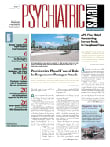Antipsychotic medications that have been approved for use in treating serious mental illnesses such as schizophrenia and bipolar disorder are increasingly being prescribed by office-based psychiatrists in an off-label use for patients with a range of common anxiety disorders.
This finding, published online July 28 in AJP in Advance, may signal psychiatrists' increased willingness to explore alternative medication regimens for patients resistant to more conventional forms of treatment for anxiety disorders, noted study authors Jonathan Comer, Ph.D. of Boston University's Center for Anxiety and Related Disorders; Ramin Mojtabai, M.D., Ph.D., of the Mental Health Department at Johns Hopkins Bloomberg School of Public Health; and Mark Olfson, M.D., M.P.H., of Columbia University's Department of Psychiatry.
However, the researchers also encouraged psychiatrists to monitor their nonapproved use of antipsychotics and called for further studies investigating the risks and benefits associated with this form of treatment for anxiety disorders.
"The dramatic increase in atypical antipsychotic use in anxiety disorders in the absence of FDA approval for these indications is surprising in view of the many medications for which there is both evidence of efficacy and FDA approval," said Charles Nemeroff, M.D., Ph.D., chair of the Department of Psychiatry and Behavioral Sciences at the University of Miami's Miller School of Medicine. "Considering the significant side-effect burden of atypical antipsychotics, and their cost, decisions of their use for non-FDA-approved indications, including anxiety disorders, should be made with careful risk-benefit evaluations."
Using data from the National Ambulatory Medical Care Survey of office-based physician visits from 1996 to 2007, the researchers studied a random sample of 4,166 outpatient visits to psychiatrists that resulted in the diagnosis of traumatic stress disorders (including posttraumatic stress disorder and acute stress), panic disorder/agoraphobia, generalized anxiety disorder, obsessive-compulsive disorder (OCD), phobias, or other anxiety disorders.
In comparing visits to office-based psychiatrists made from 1996 to 1999 with visits made from 2004 to 2007, the researchers' analysis showed a 4.5 percent increase in visits resulting in an anxiety disorder diagnosis, an increase of nearly 9 percent in the number of all visits leading to the prescription of an antipsychotic medication, and an approximate doubling of visits for the specific treatment of anxiety disorders involving the prescription of antipsychotics (from 10.6 percent to 21.3 percent).
Patients diagnosed with panic disorder or "other anxiety disorders" were more commonly prescribed antipsychotics than were those with other diagnoses in the anxiety spectrum.
The researchers also noted that the number of prescriptions written for second-generation antipsychotics in the treatment of anxiety disorders rose by nearly 17 percent between the study's two time periods, while those for first-generation antipsychotics decreased by nearly 5 percent. Specifically, patients prescribed antipsychotic medication for traumatic stress disorders were most commonly treated with quetiapine or risperidone, while individuals receiving antipsychotics for OCD were most frequently treated with olanzapine.
Additionally, the study found that new psychiatric patients saw the most significant comparative increase in antipsychotic prescriptions for anxiety disorders. Individuals with private insurance also experienced a rise in prescriptions for antipsychotic medications.
In reviewing their findings, the researchers acknowledged a lack of information about patient treatment and medication history, prescription dosage, and the observed results of antipsychotic use in treating anxiety disorders of patients during the study period.
As for reasons why the study found such a considerable increase in off-label prescribing of antipsychotics, the researchers suggested several possibilities, including physicians' increased focus on symptom reduction and the availability of new antipsychotic medications with less troublesome side-effect profiles than the earlier versions of these drugs.
The researchers also noted that some physicians consider second-generation antipsychotics to be less problematic than benzodiazepines (which have traditionally been prescribed as second-line alternatives for treatment of anxiety disorders) when it comes to cognitive side effects, withdrawal, and potential for abuse. Others have cited the "antineurotic" qualities of antipsychotic medications as weighing in their favor for patients with anxiety disorders.
